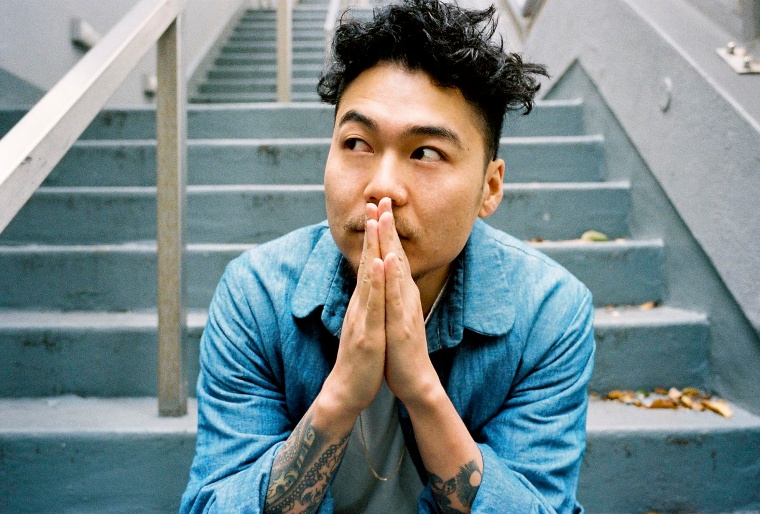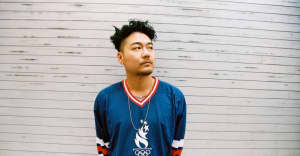 Courtesy Dumbfoundead
Courtesy Dumbfoundead
Over the past decade Jonathan “Dumbfoundead” Park has built a name for himself as a rapper, actor, and advocate for Asian-American representation in mainstream media. His music covers a wide range of topics that span from having a shitty girlfriend, to coming to America as an immigrant, and political unrest — that last one, cleverly, in a song ostensibly about the gorilla Harambe.
Dumbfoundead was born in Argentina to Korean parents. His father moved to the U.S. for work when he was just 3, so his his mother snuck him and his 1-year-old sister out of Buenos Aires and to Koreatown, Los Angeles. At 15, Dumbfoundead began testing the waters of hip-hop and gained popularity as a prominent rapper in the L.A. battle scene.
He eventually moved on from battle rapping and started releasing proper tracks and projects, which were often accompanied by remarkable visuals to match his exceptional storytelling — like on last year’s Snapchat story turned horror film, “Coachella.” Today, at 30, Dumbfoundead has a handful of albums under his belt, millions of YouTube views, and is branching beyond music with a role acting on 50 Cent’s Starz series Power.
In a phone conversation, Dumbfoundead explained when he realized the power of his words, why Asian-Americans are always considered “safe,” and what he’s doing to challenge those stereotypes.
When was the first time you realized that making music was something you absolutely had to do?
Growing up in my dad’s store in downtown Los Angeles, he was next to an electronic store that played a lot of hip-hop all day, so I grew up listening to hip-hop since I was very little. When I was like 14 years old, around the end of middle school and into the beginning of high school, I was doing a little bit of everything: DJing, graffiti, breakdancing. But I realized that emceeing was really the main shit I wanted to do because I was really like a class clown and I was good with my words.
As a Korean rapper, do you feel obligated to represent your heritage in your music?
I don’t think anybody should feel obligated. Everyone has their own reasons why they make music and I don’t make music just because I want to just talk about Asians or whatever. If somebody asks me why I started rapping, I’d be bullshitting if I said, “Oh, it’s because I want to be the voice of my people.” I wanted to start rapping because I wanted to get bitches at first. [Laughs] All the cool people in my high school were rapping, and the girls were impressed. Eventually it grew into something deeper and I became more passionate about it.
I realized that it was a powerful tool for me to talk about certain things and stories that weren’t being told. I didn’t grow up with a lot of Asian kids, so I definitely had my own identity issues and I wasn’t necessarily repping my people extra-hard or anything. That’s something that I later on realized is something that’s important to me. Now, I definitely feel like me, specifically as an artist. I definitely want to tell the stories of Asian-Americans and really kind of be the voice and represent, you know? Now I do feel obligated.
Your video for “Safe” blatantly addresses the lack of Asian-Americans featured as lead roles in Hollywood. Can you speak more about that message?
There’s the obvious underrepresentation of people of color in Hollywood. I think more than that, specifically, the word “safe” comes from — as an Asian-American in this country, a lot of times we become the punching bag of America. It’s always easy for all types of ethnicities to poke fun at Asian-Americans because they feel like we don’t speak up for ourselves or there’s no consequences. I think that’s where that word “safe” comes from. I feel like everyone perceives Asians to be very safe. And I wanted to come at it very aggressively. I wanted to change the perception of what it is to be Asian in America. Obviously there’s this discussion of white-washing of Hollywood, and I just kind of flipped the script and “yellow-washed” the white male leads in classic, iconic Hollywood films.
 Christina Paik
Christina Paik
White rappers sometimes get criticized for “trying to be black.” What are some of the stigmas or criticisms that come with being an Asian rapper?
It’s crazy because right now it happens to be a time where you’ve got all of these Asian rappers finally kind of breaking in and are being considered cool in the “scene” and the “youth rap world.” You’ve got the Keith Apes and the Rich Chiggas and all that. I’m a little bit older than both those cats and I’ve been in the rap game for a while, so the way they’re getting the hype and buzz is something that’s very new.
Those kids don’t even really get that heat. I feel like since times have changed, people are a little more receptive to different looks and different people coming into the game. When Keith [Ape] came into the game and he was doing shit in Korean, not even English, it didn’t even matter because people were still fucking with it.
In rap and hip-hop there are all types of ethnicities involved in it, but it stems from black culture so people are always going to feel a certain way. I think that the most important thing for me or anybody else who is going to participate in the culture is that you have to be genuine, you have to be all about the culture and be immersed in it. That’s when you’re going to get the respect that a lot of those kids like Chigga and Keith get — that’s why they have people who fuck with them, because they know they are part of the culture, they are immersed in it.
 Courtesy Dumbfoundead
Courtesy Dumbfoundead
All of your music videos seem to have a very specific vision. How involved are you in the creative process behind your visuals?
I definitely have a huge hand in every video I do. If you’re a rapper, especially, it’s important that you have a say in everything you do, especially music videos. I’ve had directors direct [my videos] but I’ve definitely been at least 50 percent involved in it. It generally stems from my idea and they’re able to bring it to life. I just feel like we live in a world where everyone’s doing the same type of visuals, so I don’t mind getting silly or goofy or shit cause I’m not that dude where i can just have like hot-ass girls in the video or like pop bottles in the club and shit. I need stories. Before I wanted to be a rapper, I wanted to be a filmmaker, so I have that sense of direction and I’m a big film buff.
You’ve also recently delved into the acting world with your role on Power. How did that come about?
I’ve been pursuing acting within the last year and I literally auditioned for that role and they chose me. So it was my first ever gig that I got as an actor, which was a great look. A lot of my homies and people in the industry watch that show. It was a trip because they dressed me up crazy. They knew K-pop was big and they wanted to turn me into this K-pop gangster drug lord. It was a pretty amazing experience and something that I’m going to continue to do.
I know you have a new project coming out. What’s that going to sound like? Any big features?
The mixtape is called We Might Die. It’s a little bit darker and there’s a lot of thoughts about death but not necessarily in a negative way. It’s more about thinking about death and thinking about how you’re going to live your life while you’re alive. It’s about creating your legacy and things like that. This whole idea of “we might die” is just a funny statement because we’re [all] obviously going to die — there’s no “might” about it, we are going to die. That’s kind of the theme that’s going to be on this project.
What is the best advice you’ve ever gotten about how to create good music?
Not to think too hard. I know a lot of friends and creative people — even I’ve been a victim of this — just think too hard. I’d create a body of work and I just kept thinking, It’s not good enough, it’s not good enough. And I just held back and never put it out and it took me longer and longer to put out songs and drop music but I realized that you can’t please everybody. We hold on to our stuff because we feel like it’s not good enough but the truth is it’s never really going to be good enough. It’s something based on what my mentor taught me: he called it analysis paralysis, where you think too much and you just paralyze yourself and you never release any new music. So, for me, if it feels right, I want to put it out.
